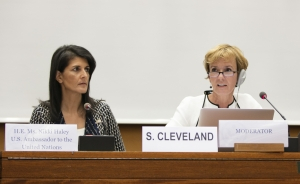The United Nations and Human Rights, Peace, and Security in Venezuela
Louis Henkin Professor of Human and Constitutional Rights and UN Human Rights Committee Member Sarah Cleveland discusses the need to strengthen democracy and human rights in Venezuela with U.S. Ambassador to the UN Nikki Haley and panel of experts on human rights in the Americas

June 22, 2017, NEW YORK – The importance of upholding basic human rights and rule of law was a central theme at a side event co-sponsored by the United States and other governments on the heels of the UN Human Rights Council Session in Geneva last week: “Human Rights and Democracy in Venezuela.” Moderated by Sarah Cleveland, the Louis Henkin Professor of Human and Constitutional Rights and faculty co-director of the Human Rights Institute at Columbia Law School, the event was an opportunity for Latin American experts, diplomats, and human rights experts to discuss the current political context in Venezuela, root causes of instability, and ways for the international community to promote democracy and protect basic rights.
Addressing the social, political and economic crisis and insecurity in Venezuela has been a consistent foreign policy priority for the United States. Ambassador Haley is using her unique role to advocate for the United Nations Security Council, and the Human Rights Council, in particular, to take action in light of the “rapidly deteriorating human rights situation in Venezuela.”
During the side event, Ambassador Haley underscored the need to ensure basic rights and representative democracy for all Venezuelans: "There are many things that could be done to help the people of Venezuela. But they really only need one thing: a free election." She also called on the Human Rights Council to take action to support a “peaceful, democratic solution.”
While the current Venezuelan President, Nicolas Maduro, and his representatives continue to challenge the U.S. characterization of Venezuela as a human rights violator, and seek to undermine the U.S.’ authority as a global leader on human rights, Venezuelan and regional civil society groups paint a grimmer picture of the economic, political, and social situation on the ground. The event offered an opportunity to discuss issues including violent crackdowns on protestors, resulting in 60 deaths; the acute shortages of medicines and other humanitarian goods, and intentional efforts to weaken democratic laws and institutions.
“Venezuela is posing a fundamental challenge for our regional and international human rights institutions,” Cleveland observed. The country previously withdrew from the American Convention on Human Rights, and when the Organization of American States attempted to respond to the recent crisis this year, Venezuela indicated it would withdraw from the OAS. “So the critical question now is whether our international mechanisms, including the Human Rights Council, will step up to effectively address the situation.”
Panelists included:
Alonso Medina Roa, Foro Penal
Mercedes de Freitas, Transparencia Venezuela
Julio Henriquez, Refugee Freedom Program
Laura Louza Scognamiglio, Accesso a la Justicia
Edison Lanza, Special Rapporteur for Freedom of Expression,
Inter-American Commission on Human Rights
Cleveland’s participation in the event forms part of the Human Rights Institute’s broader efforts to educate the public about using regional and international mechanisms, particularly through the Inter-American human rights system, and to build connectivity among human rights oversight mechanisms, in order to enhance protection of human rights.
